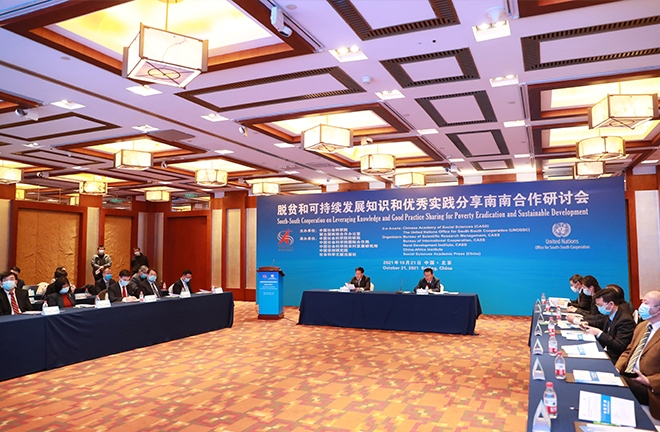Seminar shares poverty reduction experience

The seminar sheds light on international poverty alleviation. Photo: Zhu Gaolei/CSST
On Oct. 21, a seminar on South-South Cooperation on Leveraging Knowledge and Good Practice Sharing for Poverty Eradication and Sustainable Development was convened. The seminar was jointly hosted by the Chinese Academy of Social Sciences (CASS) and the United Nations Office for South-South Cooperation (UNOSSC).
At the seminar, representatives from UNDP’s Human Development Report Office, the South Center, and other international organizations shared useful explorations of international organizations and intergovernmental organizations in facilitating international poverty alleviation and sustainable development. Representatives of nearly ten national think tanks from developing countries in Asia, Africa, and Latin America introduced their best practices and research findings in poverty alleviation based on their own experience.
CASS President Xie Fuzhan pointed out that China’s achievements in poverty alleviation have attracted worldwide attention and are of great significance to China and the world. Since the reform and opening up, 770 million rural poor people in China have been lifted out of poverty according to the current standards; according to the World Bank’s international poverty standards, China’s poverty reduction population accounted for more than 70% of the global total during the same period.
In light of still severe global poverty and an increasing wealth gap in some countries, China achieved the poverty reduction target of the UN 2030 Agenda for Sustainable Development ten years ahead of schedule, Xie said.
“Due to the similar circumstances for development, China’s poverty reduction experience has brought a lot of enlightenment to the innovation of international poverty governance theories and to speeding up poverty alleviation in the vast number of developing countries,” Xie said.
Abdullah Shahid, president of the 76th United Nations General Assembly, said that as a broad framework for cooperative action, South-South cooperation provides a necessary platform for solving complex global problems.
Today, the COVID-19 pandemic has exacerbated the vulnerabilities and inequalities within and among countries, and reversed the accomplishments of sustainable development, greatly hindering the realization of the goals of the UN 2030 Agenda for Sustainable Development. In such an era, the function and significance of South-South cooperation are self-evident, Shahid said.
Under the guide of the Chinese government’s framework for South-South cooperation, CASS will actively implement the “Global Development Initiative,” deepen exchanges and cooperation with the UNOSSC, and make contributions to achieving the goals of the UN 2030 Agenda for Sustainable Development, Xie said.
At the seminar, CASS and UNOSSC signed a memorandum of understanding to formally establish a cooperative partnership, and the promotion of the Global Development Initiative was included as a formal clause in the memorandum.
The seminar also witnessed the establishment of the Think Tank Network for Poverty Alleviation and Sustainable Development. CASS Vice President Wang Linggui was elected as the network’s chairman.
As the network’s chair, CASS will invite more think tanks in developing countries to join the network and strive to build it into a pivotal think tank network that covers developing countries across the globe.
Wei Houkai, director of the Rural Development Institute at CASS, shared the effectiveness and experience of poverty reduction in rural China. In 2016, CASS implemented a national research project, surveying 100 villages’ targeted poverty alleviation and reduction. The survey found that sustained and rapid economic development, strong institutional guarantees and policy support, and extensive participation of the whole society are the three cornerstones for the success of poverty reduction in rural China.
Edited by JIANG HONG

 PRINT
PRINT CLOSE
CLOSE